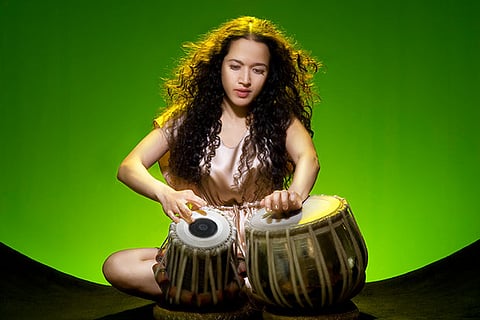

Chennai
Suphala, a tabla virtuoso, from the US, revels in blending genres, as part of her musical adventures. Raised by Indian parents, she knew early on that her life would revolve around the beat. Having trained under legendary maestros, Suphala has performed with a veritable who’s who of the music world. Excerpts from an interview:
You started learning western classical music on the piano when you were four years old. How did your love affair with the tabla begin?
When I was 3, my older sister brought home a violin and I started crying as I wanted to play it so badly. I pleaded with my parents and they inquired with some music teachers. And it was suggested that the piano was something I could start learning at the age of four, so I did. I was born with a strong urge to play music. A few years later, I started exploring other instruments. I found drumming and rhythm came naturally to me. Going to Indian Classical concerts, it was always the tabla that I zoned in on.
How did your tutelage under Ustad Zakir Hussain and his father, late Ustad Alla Rakha influence your perspectives on music?
Once I started learning tabla under these one-of-a-kind masters, there was no turning back. They opened up an entirely new and limitless way of thinking about music. I knew I could spend the rest of my life doing this. I was fortunate to be introduced to Zakir ji and attend his classes in California. At his suggestion, I began studying with his father. For many years, I spent a few months in Mumbai to study with Abba ji (Ustad Alla Rakha). Those
lessons are with me forever and I still find new layers of beauty in them.
Tell us about your experience of playing in Kabul after the fall of the Taliban?
I agreed to the invitation out of curiosity and to hear from Afghan musicians what it was like to live under a regime where you could be killed for playing music. The musicians were all men and were fascinated by my being a woman. I am sure they wouldn’t allow women in their families to perform. But when we sat down to make music together, all pre-conceived ideas went out the window. It was all about the music, our universal language. We had a good time.
You collaborated with artists like Yoko Ono and Norah Jones. Were you keen on experimenting?
If I am to express myself through music, I have to express who I am. My identity has always involved more than one culture and genre of music. Indian Classical music has a deep and rich tradition which is also meant to be improvised. That notion, along with the tabla’s versatility in its tonal range and vast rhythmic repertoire, allows for endless types of collaboration in music. So, I’ve been able to explore both the traditional and non-traditional forms.
Have you had an opportunity to collaborate with artists from Chennai?
Recently, I performed with Ravi Chary ji in Chennai, which was a lovely experience. I have friends in the city who are musical geniuses, like Selva Ganesh and his family who are legends in the rhythm world. I hope to come back often to collaborate with artistes from this amazing city.
Tell us about your projects.
Since I produce, compose, and engineer music, I have many tracks in the works to be completed and released in the coming months. Some are duo collaborations while some are solo tracks. I’ll be in India performing throughout this winter season 2015-16.
Visit news.dtnext.in to explore our interactive epaper!
Download the DT Next app for more exciting features!
Click here for iOS
Click here for Android